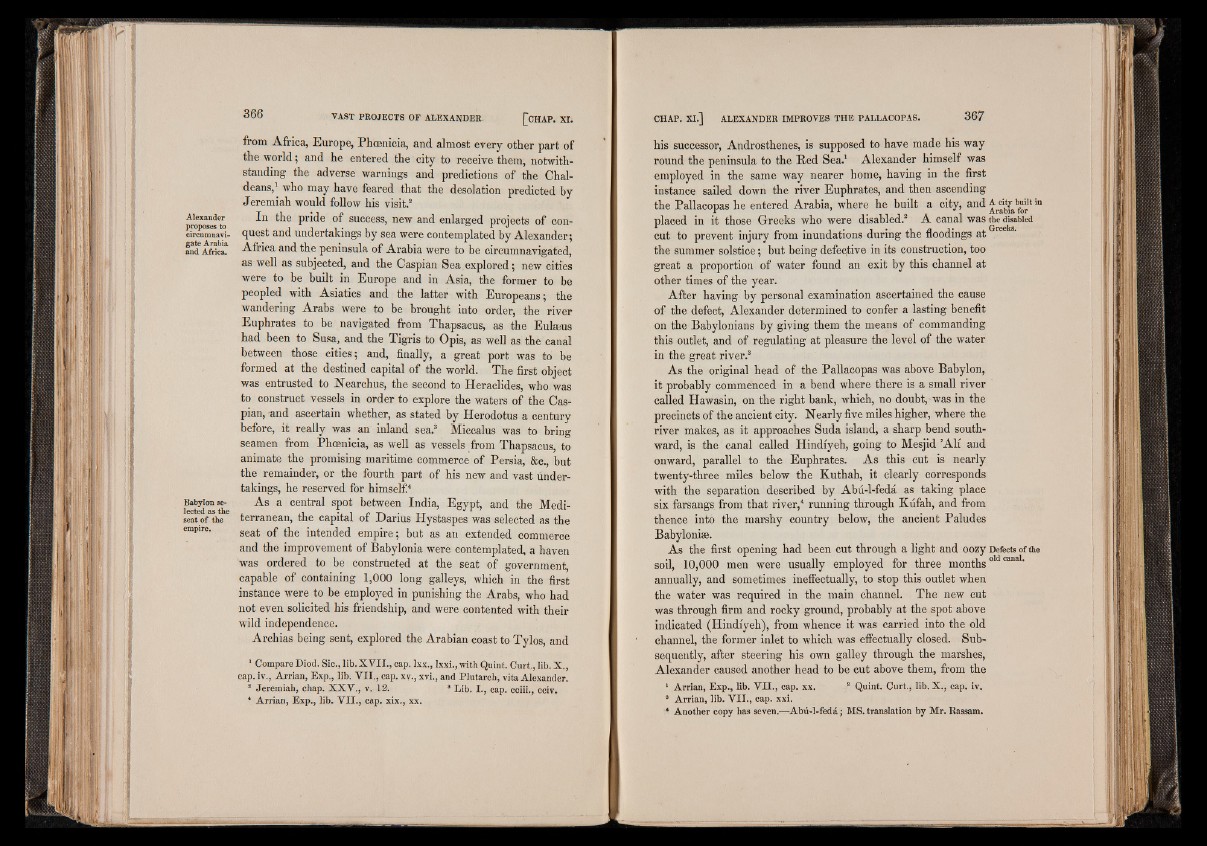
Alexander
proposes to
circumnavigate
Arabia
and Africa.
Babylon selected
as the
seat of the
empire.
from Africa, Europe, Phoenicia, and almost every other part of
the world; and he entered the city to receive them, notwithstanding
the adverse warnings and predictions of the Chaldeans,
1 who may have feared that the desolation predicted by
Jeremiah would follow his visit.2
In the pride of success, new and enlarged projects of conquest
and undertakings by sea were contemplated by Alexander;
Africa and the peninsula of Arabia were to be circumnavigated,
as well as subjected, and the Caspian Sea explored; new cities
were to be built in Europe and in Asia, the former to be
peopled with Asiatics and the latter with Europeans; the
wandering Arabs were to be brought into order, the river
Euphrates to be navigated from Thapsacus, as the Eukeus
had been to Susa, and the Tigris to Opis, as well as the canal
between those cities; and, finally, a great port was to be
formed at the destined capital of the world. The first object
was entrusted to Nearchus, the second to Heraclides, who was
to construct vessels in order to explore the waters of the Caspian,
and ascertain whether, as stated by Herodotus a century
before, it really was an inland sea.3 Miccalus was to bring
seamen from Phoenicia, as well as vessels from Thapsacus, to
animate the promising maritime commerce of Persia, &c., but
the remainder, or the fourth part of his new and vast undertakings,
he reserved for himself.4
As a central spot between India, Egypt, and the Mediterranean,
the capital of Darius Hystaspes was selected as the
seat of the intended empire; but as an extended commerce
and the improvement of Babylonia were contemplated, a haven
was ordered to be constructed at the seat of government,
capable of containing 1,000 long galleys, which in the first
instance were to be employed in punishing the Arabs, who had
not even solicited his friendship, and were contented with their
wild independence.
Archias being sent, explored the Arabian coast to Tylos, and
1 Compare Diod. Sic., lib .X V II., cap. lxx., Ixxi., with Quint. C u rt, lib. X .,
cap. iv., Arrian, Exp., lib. V I I ., cap. xy., xvi., and Plutarch, vita Alexander.
8 Jeremiah, chap. X X V ., v. 12. 8 Lib. I ., cap. cciii., cciv.
4 Arrian, Exp., lib. V I I ., cap. xix., xx.
his successor, Androsthenes, is supposed to have made his way
round the peninsula to the Bed Sea.1 Alexander himself was
employed in the same way nearer home, having in the first
instance sailed down the river Euphrates, and then ascending
the Pallacopas he entered Arabia, where he built a city, and f“1*in
placed in it those Greeks who were disabled.2 A canal was the disabled
cut to prevent injury from inundations during the floodings at
the summer solstice; but being defective in its construction, too
great a proportion of water found an exit by this channel at
other times of the year.
After having by personal examination ascertained the cause
of the defect, Alexander determined to confer a lasting benefit
on the Babylonians by giving them the means of commanding
this outlet, and of regulating at pleasure the level of the water
in the great river.3
As the original head of the Pallacopas was above Babylon,
it probably commenced in a bend where there is a small river
called Hawasin, on the right bank, which, no doubt,-was in the
precincts of the ancient city. Nearly five miles higher, where the
river makes, as it approaches Suda island, a sharp bend southward,
is the canal called Hindiyeh, going to Mesjid ’Ali and
onward, parallel to the Euphrates. As this cut is nearly
twenty-three miles below the Kuthah, it clearly corresponds
with the separation described by Abu-l-feda as taking place
six farsangs from that river,4 running through Kufah, and from
thence into the marshy country below, the ancient Paludes
Babyloniae.
As the first opening had been cut through a light and oozy Defects of the
soil, 10,000 men were usually employed for three months01 0300'
annually, and sometimes ineffectually, to stop this outlet when
the water was required in the main channel. The new cut
was through firm and rocky ground, probably at the spot above
indicated (Hindiyeh), from whence it was carried into the old
channel, the former inlet to which was effectually closed. Subsequently,
after steering his own galley through the marshes,
Alexander caused another head to be cut above them, from the
1 Arrian, Exp., lib. V I I ., cap. xx. 8 Quint. Curt., lib. X., cap. iv.
8 Arrian, lib. V I I ., cap. xxi.
4 Another copy has seven.—Abu-l-fedd; MS. translation by Mr. Kassam.